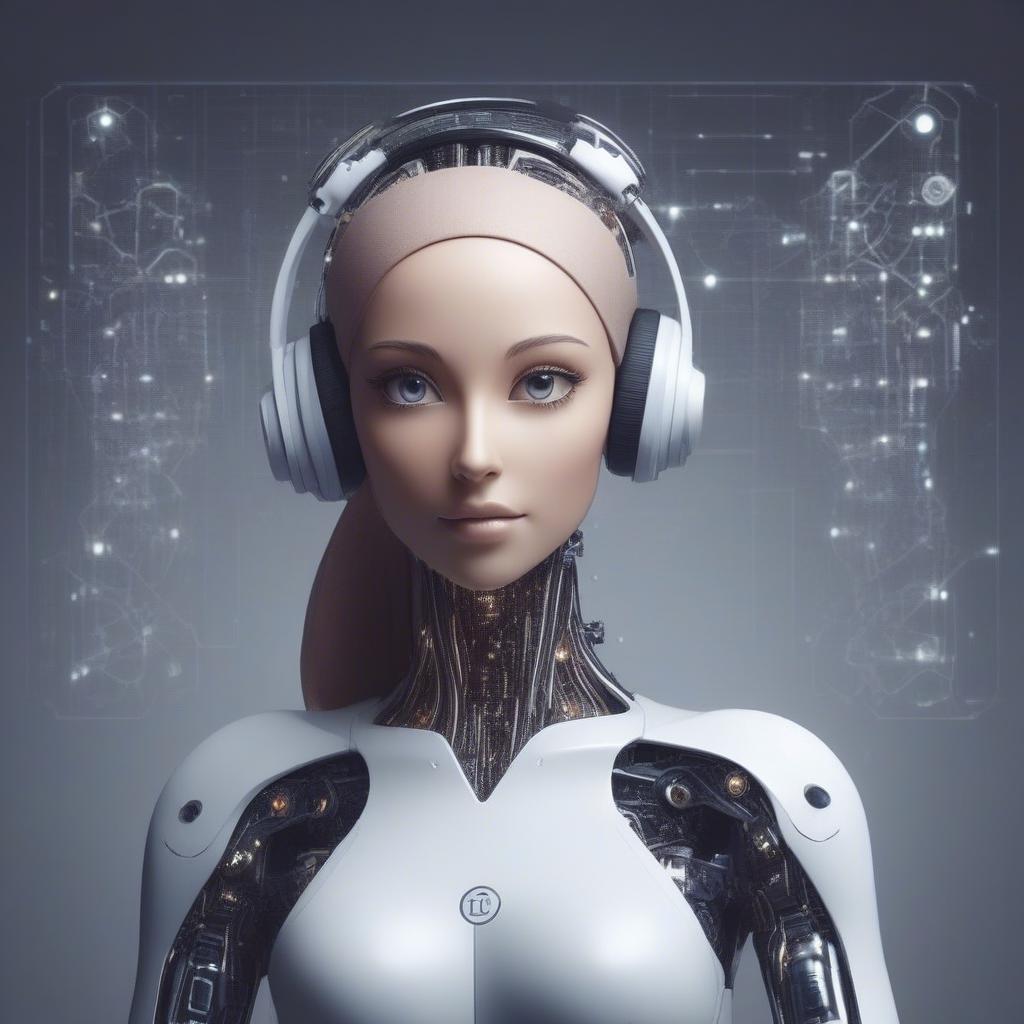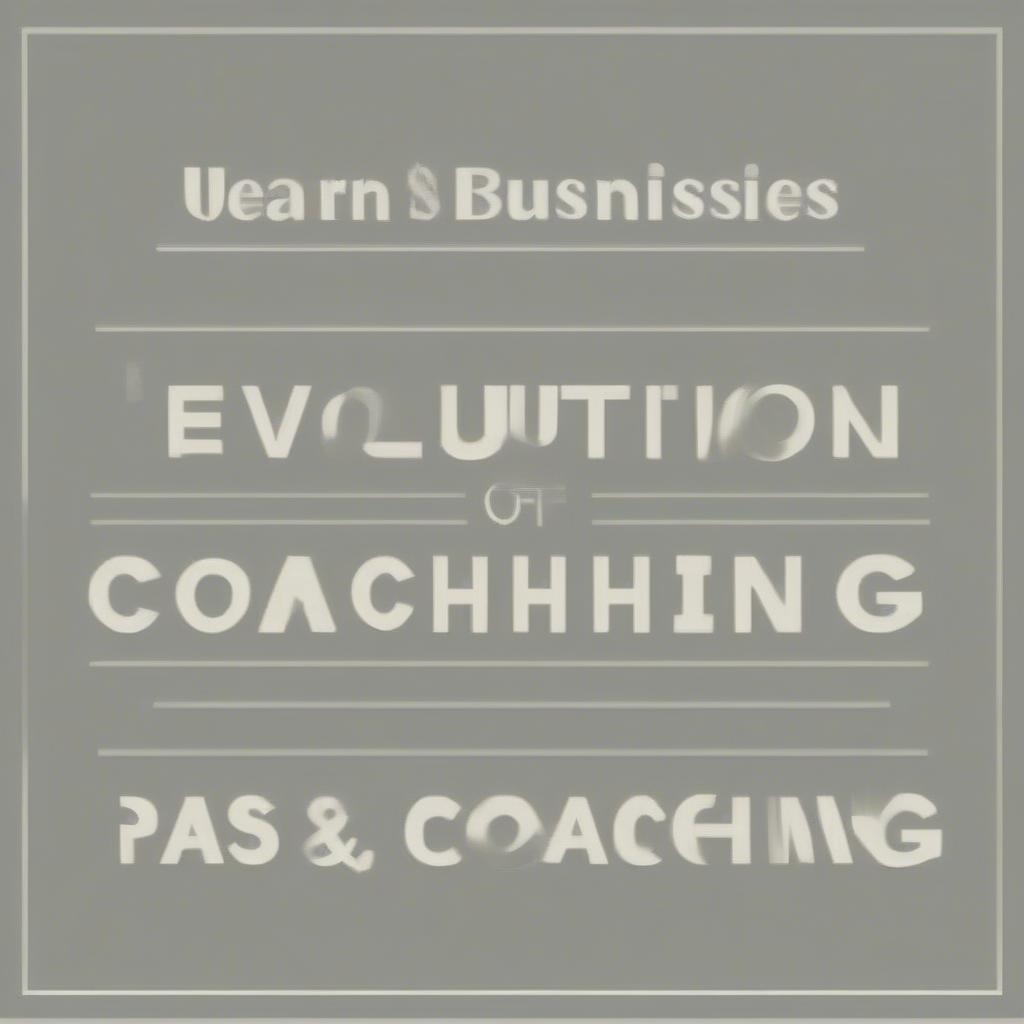
The Dawn of AI-Powered Coaching: A New Era
The world of coaching, once solely reliant on human intuition and experience, is undergoing a profound transformation. The catalyst? Artificial intelligence (AI). We’re not talking about robots replacing coaches; instead, AI is poised to become a powerful tool, augmenting human capabilities and creating unprecedented opportunities for growth and development. This isn’t science fiction; it’s happening now. From personalized learning paths to 24/7 support, coaching technology is evolving rapidly, reshaping how we approach personal and professional advancement. This article will explore the thrilling possibilities and potential pitfalls of this new era, offering a glimpse into the future of coaching.
What Does AI Bring to the Coaching Table?
AI is not just another tech buzzword in coaching innovation; it’s a fundamental shift. It offers unique capabilities that human coaches alone can’t provide:
- Data-Driven Insights: AI can analyze vast amounts of data, identifying patterns and trends that human coaches might miss. This includes analyzing communication styles, performance metrics, and emotional cues to provide tailored feedback and support.
- Scalability: Unlike human coaches, AI tools can handle numerous clients simultaneously, making high-quality coaching more accessible and affordable. This is especially relevant for large organizations needing to train and develop their entire workforce.
- Personalization: AI algorithms can tailor coaching programs to individual needs and preferences. This ensures that each person receives the support that is most relevant to their situation and goals.
- 24/7 Availability: AI-powered coaching platforms are always available, providing support and guidance whenever and wherever needed. This constant accessibility is invaluable for clients who have demanding schedules or who prefer to work outside of typical coaching hours.
- Objective Feedback: AI can provide unbiased assessments of performance and progress, free from human biases that might influence subjective evaluations. This can lead to more accurate and effective coaching interventions.
Why the Shift Towards AI in Coaching?
The increasing adoption of AI in coaching isn’t random. It’s driven by several converging factors:
- Demand for Personalized Development: Individuals and organizations alike are increasingly demanding personalized solutions that meet their unique needs. AI excels at providing customized experiences, which makes it a perfect fit for coaching.
- Need for Scalable Solutions: Organizations are looking for effective ways to develop their workforce without breaking the bank. AI-powered coaching offers a cost-effective way to reach a large number of employees with tailored development programs.
- Advancements in AI Technology: Rapid advancements in areas like machine learning and natural language processing have made AI more capable of handling the complexities of coaching. The algorithms are becoming smarter and more intuitive.
- Increased Data Availability: The digital world generates a wealth of data that AI can use to improve coaching outcomes. From online assessments to digital performance reviews, the data is readily available.
- Desire for Measurable Results: AI provides the ability to track progress and measure the effectiveness of coaching interventions, which helps ensure the investment in coaching yields tangible returns.
Exploring the Opportunities: Unleashing the Potential
The integration of AI into coaching is opening up a world of exciting opportunities, both for coaches and clients. Let’s dive into some key areas where AI is making a significant impact:
Enhanced Personalized Learning Journeys
Imagine a coach that knows you intimately, understands your strengths, weaknesses, and learning style, and crafts a program specifically for you. That’s the power of AI-driven personalization in coaching.
- Adaptive Learning Platforms: AI algorithms can analyze user data to create adaptive learning pathways that adjust based on performance. This means that learners spend more time on areas where they need improvement and less time on areas they’ve already mastered.
- Personalized Feedback: AI can analyze a client’s communication patterns, work habits, and progress to provide personalized feedback. This feedback is more likely to resonate with the client, leading to greater improvements.
- Tailored Content Delivery: AI can curate resources and learning materials that are specifically relevant to a client’s goals and needs. This eliminates the need for generic, one-size-fits-all coaching programs.
Example: An AI-powered platform might track a client’s progress on a leadership training course, noticing that they struggle with delegating tasks. The AI would then provide targeted resources on effective delegation strategies, offer practice scenarios, and adjust the course curriculum to focus more on this specific skill.
24/7 Coaching Support: Always There When You Need It
One of the limitations of traditional coaching is that human coaches are not always available. AI addresses this issue by providing 24/7 support, which is crucial for clients who need assistance outside of regular business hours or who require immediate feedback.
- AI Chatbots: AI-powered chatbots can answer frequently asked questions, provide guidance, and offer encouragement whenever clients need it. These bots can handle routine queries, freeing up human coaches to focus on more complex issues.
- Virtual Coaches: AI can power virtual coaching platforms that offer personalized guidance and support through chat, video, and audio interactions. These virtual coaches can help clients stay on track, provide motivation, and offer quick tips.
- On-Demand Resources: AI can make a library of resources, such as articles, videos, and exercises, available to clients anytime, anywhere. This on-demand access ensures that clients always have the tools they need to succeed.
Example: A client who is feeling overwhelmed with an upcoming project can reach out to an AI chatbot late at night to receive tips on time management, reducing anxiety, and breaking down large tasks into smaller, manageable steps.
Scalable Coaching Solutions for Organizations
For large organizations, providing individual coaching to every employee can be costly and time-consuming. AI offers a scalable solution that allows companies to develop their workforce efficiently and effectively.
- AI-Driven Talent Development: AI can help organizations identify high-potential employees, assess skill gaps, and create personalized development plans for entire teams or departments.
- Automated Coaching Programs: AI can automate many aspects of the coaching process, such as assigning learning activities, tracking progress, and providing feedback, thereby reducing the administrative burden on HR and development teams.
- Data-Driven Insights for HR: AI can provide HR departments with data-driven insights into employee performance, engagement, and development needs. These insights can inform strategic decisions about talent management and organizational development.
Example: A large tech company might use an AI-powered platform to assess the coding skills of its engineers. Based on the assessment, the platform creates personalized development plans that include tailored courses, practice exercises, and mentor matching.
Enhanced Coach Productivity and Effectiveness
The integration of AI isn’t just about replacing human coaches. It’s about empowering them with tools that enhance their productivity and effectiveness, allowing them to focus on higher-value tasks.
- AI-Powered Admin Tools: AI can automate many administrative tasks, such as scheduling appointments, tracking progress, and preparing reports, freeing up coaches to focus on their core responsibilities.
- Client Insights: AI can provide coaches with insights into their clients’ behaviors, preferences, and progress, enabling them to provide more targeted and effective coaching.
- Resource Curation: AI can help coaches curate relevant resources and learning materials for their clients, saving them time and effort.
Example: A human coach can use AI to analyze a client’s communication patterns to identify areas for improvement. This information helps the coach to design more targeted interventions during coaching sessions.
AI Trends Shaping the Future of Coaching
We’re already seeing exciting AI trends that are rapidly reshaping the coaching landscape:
- Natural Language Processing (NLP): NLP is enabling AI to understand human language more effectively. This means that AI-powered coaches can engage in more natural and intuitive conversations with clients.
- Machine Learning (ML): ML algorithms allow AI to learn from data, improving its coaching capabilities over time. As the system interacts with more clients, it becomes better at understanding individual needs and delivering personalized support.
- Emotion AI: AI is increasingly capable of recognizing and responding to human emotions. This enables AI-powered coaches to provide more empathetic and emotionally intelligent support.
- Generative AI: Generative AI can create personalized content, including learning materials, feedback reports, and coaching plans. This automation significantly reduces the administrative burden on coaches and clients.
- Gamification: AI is being used to gamify coaching programs, making them more engaging and motivating for clients. Gamification features include points, badges, leaderboards, and challenges.
Navigating the Challenges: Addressing Potential Pitfalls
While the opportunities of AI in coaching are compelling, it’s crucial to address the potential challenges:
Data Privacy and Security
AI-powered coaching platforms collect and process vast amounts of personal data. Ensuring the privacy and security of this data is crucial.
- Compliance with Regulations: Coaching platforms must comply with data privacy regulations, such as GDPR and CCPA. This requires implementing robust security measures and obtaining user consent for data collection.
- Transparent Data Usage: Clients should be informed about how their data is being used and have control over their data. Transparency is essential for building trust and ensuring ethical data practices.
- Data Security Measures: Coaching platforms must invest in data security measures to protect against data breaches and cyberattacks. This includes using encryption, access controls, and regular security audits.
Tip: Choose coaching platforms that are transparent about their data privacy practices and have a strong track record of security.
The Risk of Dehumanization
Over-reliance on AI in coaching could lead to a dehumanized experience, especially if the human element is completely removed.
- Maintaining the Human Connection: It’s crucial to find a balance between AI automation and human interaction. AI should be used as a tool to augment, not replace, human coaches.
- Empathy and Emotional Intelligence: AI, while becoming more sophisticated, cannot replicate the full spectrum of human empathy and emotional intelligence. This is a crucial aspect of coaching that should not be overlooked.
- Personal Touch: The human touch, including active listening, empathy, and personalized advice, remains essential in coaching. AI should complement, not diminish, these qualities.
Tip: Look for coaching models that blend AI technology with human interaction to create a more holistic experience.
The Potential for Bias
AI algorithms are trained on data, and if the data contains biases, the AI will also be biased. This can lead to inequitable coaching experiences.
- Diverse Data Sets: Ensure that the data used to train AI algorithms is diverse and representative of the population being served. This helps to mitigate bias and promote equitable outcomes.
- Regular Bias Audits: Implement regular bias audits to identify and correct any biases that may be present in the AI algorithms.
- Human Oversight: Human coaches should be involved in the process to identify and mitigate biases that might be missed by AI.
Tip: Advocate for coaching platforms that prioritize fairness and equity and actively work to eliminate bias in their AI systems.
Over-reliance on AI
Relying too heavily on AI could lead to a decline in human coaching skills and critical thinking.
- Continued Professional Development: Human coaches should continue to develop their skills and adapt to the changing landscape of coaching. This will ensure they remain effective in a world increasingly influenced by AI.
- Critical Evaluation: Both coaches and clients should critically evaluate AI-generated insights and feedback. Relying too heavily on AI can stifle creativity and critical thinking.
- Balanced Approach: It’s essential to adopt a balanced approach that integrates AI technology with human experience and judgment.
Tip: Use AI as a support tool, but don’t abandon the core human skills that make coaching effective.
Ethical Considerations
The use of AI in coaching raises several ethical considerations that need to be carefully addressed.
- Transparency: Be transparent about how AI is being used and ensure that clients are aware of the involvement of AI in their coaching experience.
- Informed Consent: Obtain informed consent from clients before using AI in their coaching programs.
- Accountability: Establish clear lines of accountability for AI-driven coaching interventions.
Tip: Engage in ethical discussions and advocate for responsible and ethical use of AI in coaching.
Practical Steps to Embrace AI in Your Coaching Practice
Now that we’ve explored the opportunities and challenges, let’s look at practical steps coaches can take to integrate AI into their practices:
- Research and Exploration: Begin by exploring different AI-powered coaching platforms and tools. Understand their capabilities and how they can enhance your current services.
- Experiment with Tools: Start with free trials or pilot programs to experiment with different tools. This will help you understand what works best for your clients and your coaching style.
- Integrate Gradually: Introduce AI tools gradually into your practice. Don’t try to overhaul your entire approach overnight.
- Focus on Enhancing, Not Replacing: Remember that AI is there to enhance your capabilities, not to replace them. Focus on using AI to improve efficiency and personalization, while continuing to provide the human touch.
- Communicate with Clients: Be transparent with your clients about how you’re using AI and address any concerns they may have.
- Continuously Learn: The field of AI is constantly evolving, so it’s crucial to stay up to date on the latest developments and trends in coaching technology.
Template Example:
AI Integration Plan Template
Phase 1: Research and Exploration (1-2 Weeks)
- Goal: Identify 2-3 AI coaching tools that align with my coaching style and client needs.
- Action:
- Research AI coaching platforms (e.g., chatbots, learning management systems).
- Explore case studies and testimonials.
- Identify a tool that offers a free trial or pilot program.
Phase 2: Experimentation (2-4 Weeks)
- Goal: Test 1-2 AI tools with a small group of clients.
- Action:
- Integrate the AI tool into a specific coaching activity.
- Gather feedback from clients.
- Track the effectiveness of the AI integration.
Phase 3: Gradual Integration (Ongoing)
- Goal: Systematically implement AI tools into my coaching practice.
- Action:
- Continuously evaluate AI tools and adjust usage.
- Provide training to clients on how to use AI effectively.
- Stay informed about new AI developments and trends.
Learn Business: Supporting Businesses Through the AI Evolution in Coaching
At Learn Business, we understand that navigating the complexities of coaching innovation can be challenging for businesses. That’s why we offer tailored support designed to empower your organization to succeed in this new era of AI-powered coaching. We offer a wealth of resources, guidance and templates:
- AI Strategy Consulting: Our experts can help your business develop a clear AI integration strategy, ensuring that your coaching efforts align with your overall organizational goals.
- Custom Template Creation: We provide custom templates for creating AI coaching programs and resources, saving you time and effort in implementation.
- Training and Support: We offer workshops and training sessions to help your coaches and employees understand how to effectively use AI tools.
- Data Analysis and Reporting: We can help you track the results of your AI-powered coaching initiatives and measure the impact on your business.
- Personalized Coaching Roadmaps: We create personalized coaching roadmaps for your businesses, taking into consideration your specific industry and unique business demands.
We are committed to helping businesses not just survive, but thrive in the age of AI-enhanced coaching. Our guidance and templates are designed to simplify the complexities and help you unlock the full potential of your team.
Conclusion: Embracing the Future of Coaching
The future of coaching is undeniably intertwined with AI. While challenges exist, the opportunities are immense. By thoughtfully integrating AI into coaching practices, we can create more personalized, effective, and scalable development solutions. The key is to approach this transformation with a human-centered perspective, ensuring that technology serves to augment human capabilities, not replace them. As we move forward, a balanced approach, focusing on ethics, empathy, and continuous learning, will be crucial to unlock the full potential of AI in coaching and truly transform how we learn and grow. By embracing this evolution, we are not just shaping the future of coaching but also the future of human potential.
This is the age of coaching technology and AI trends. Embracing coaching innovation is no longer optional—it’s essential.



Leave a Reply